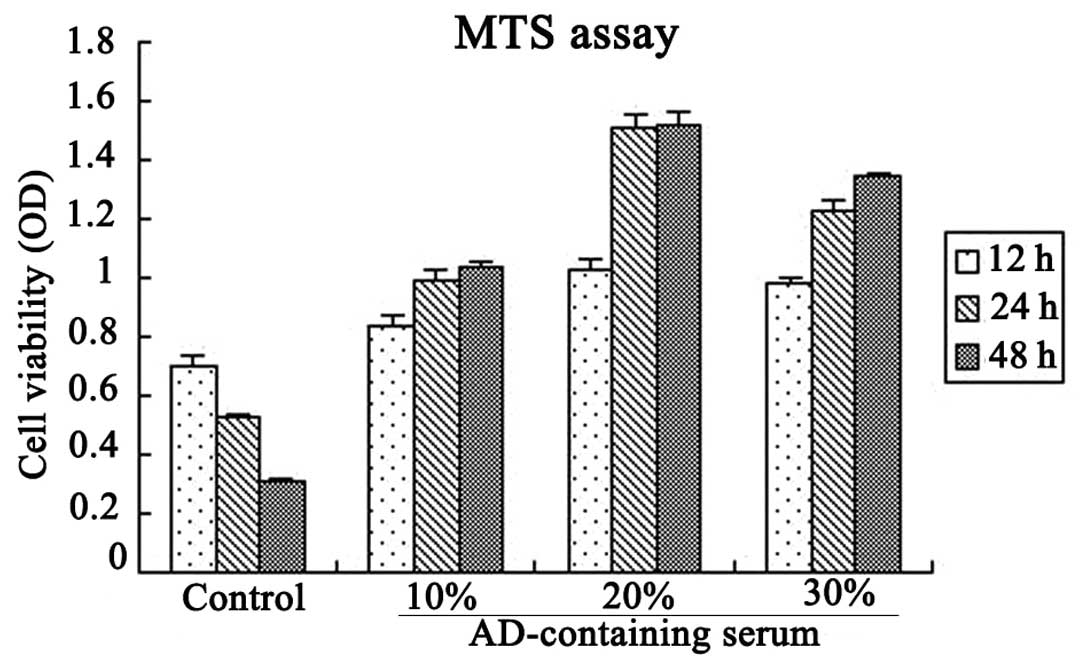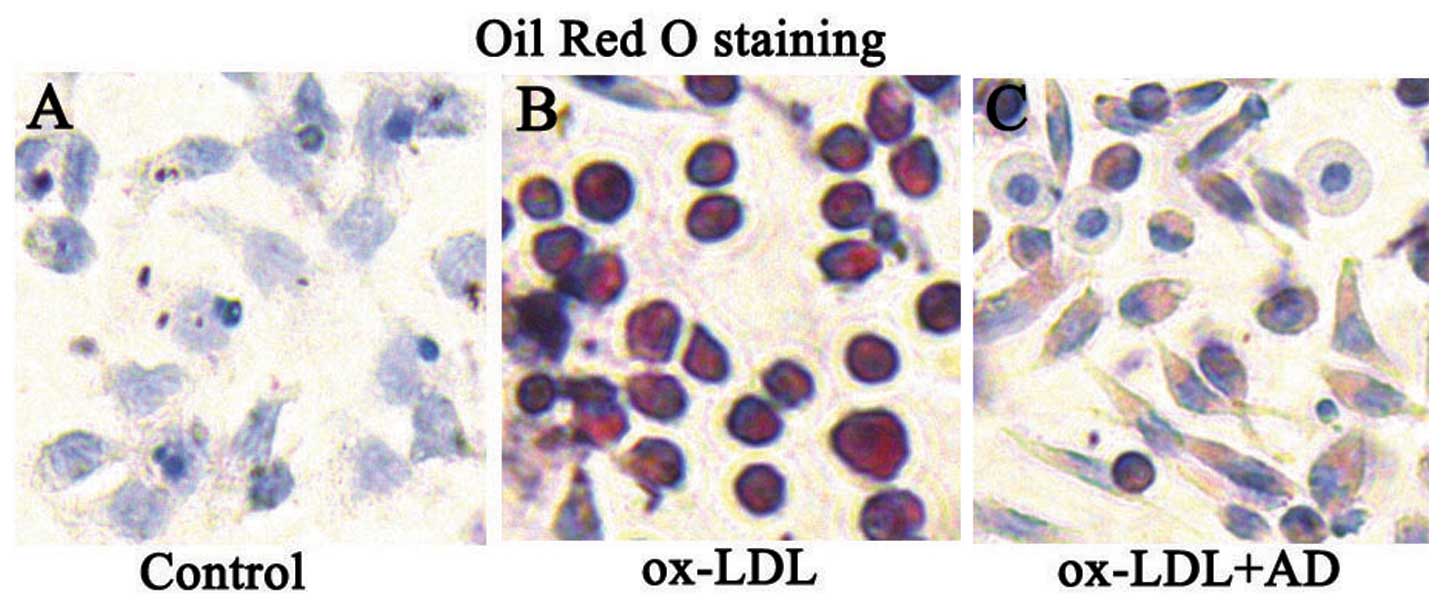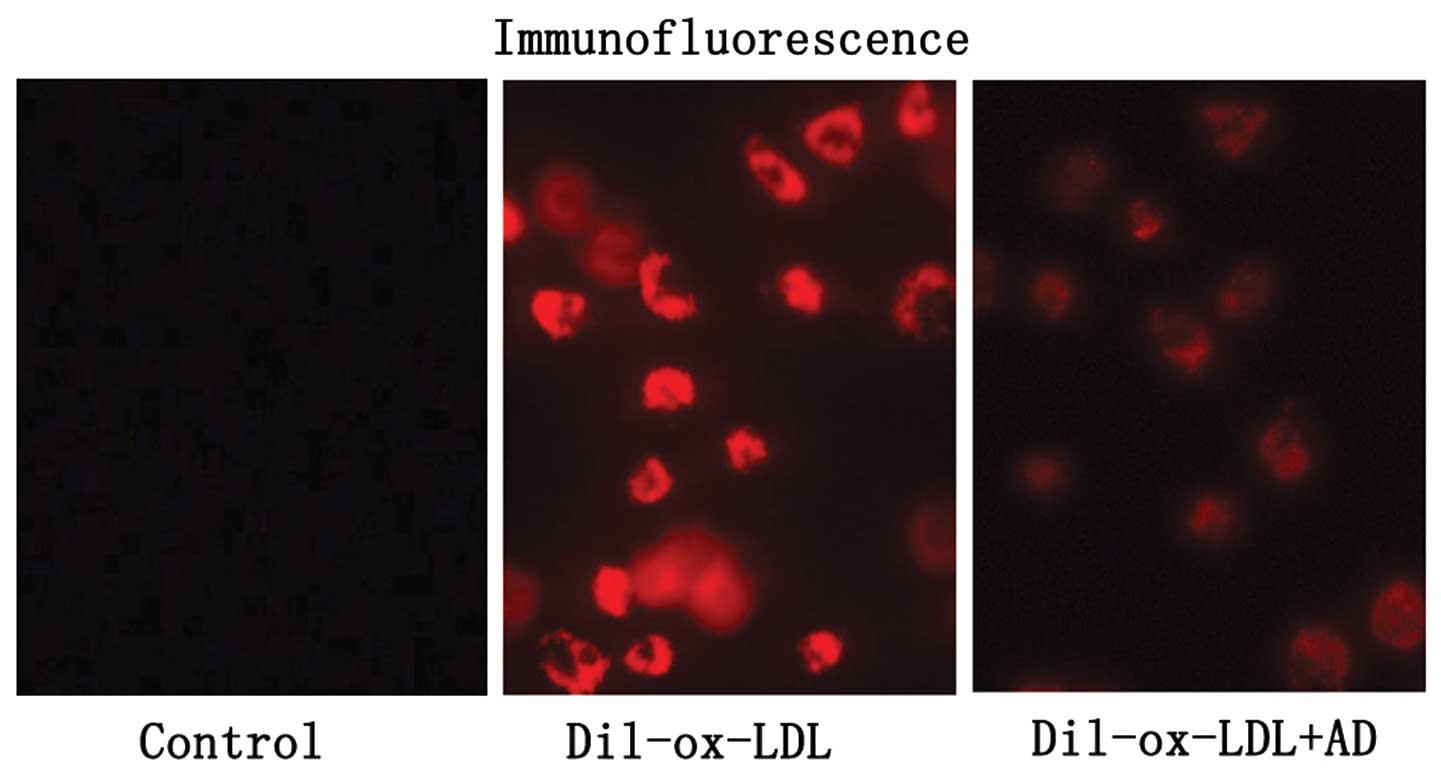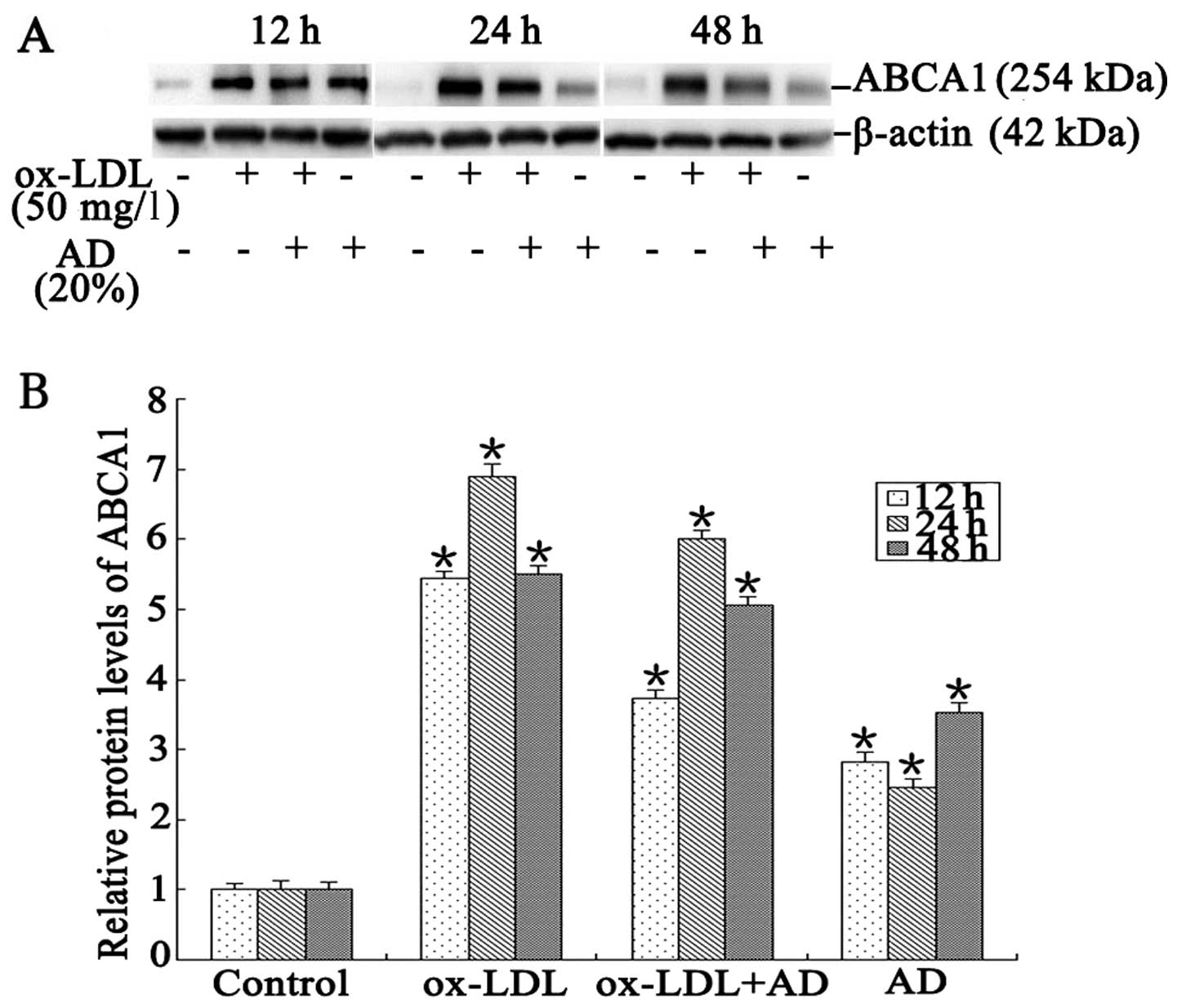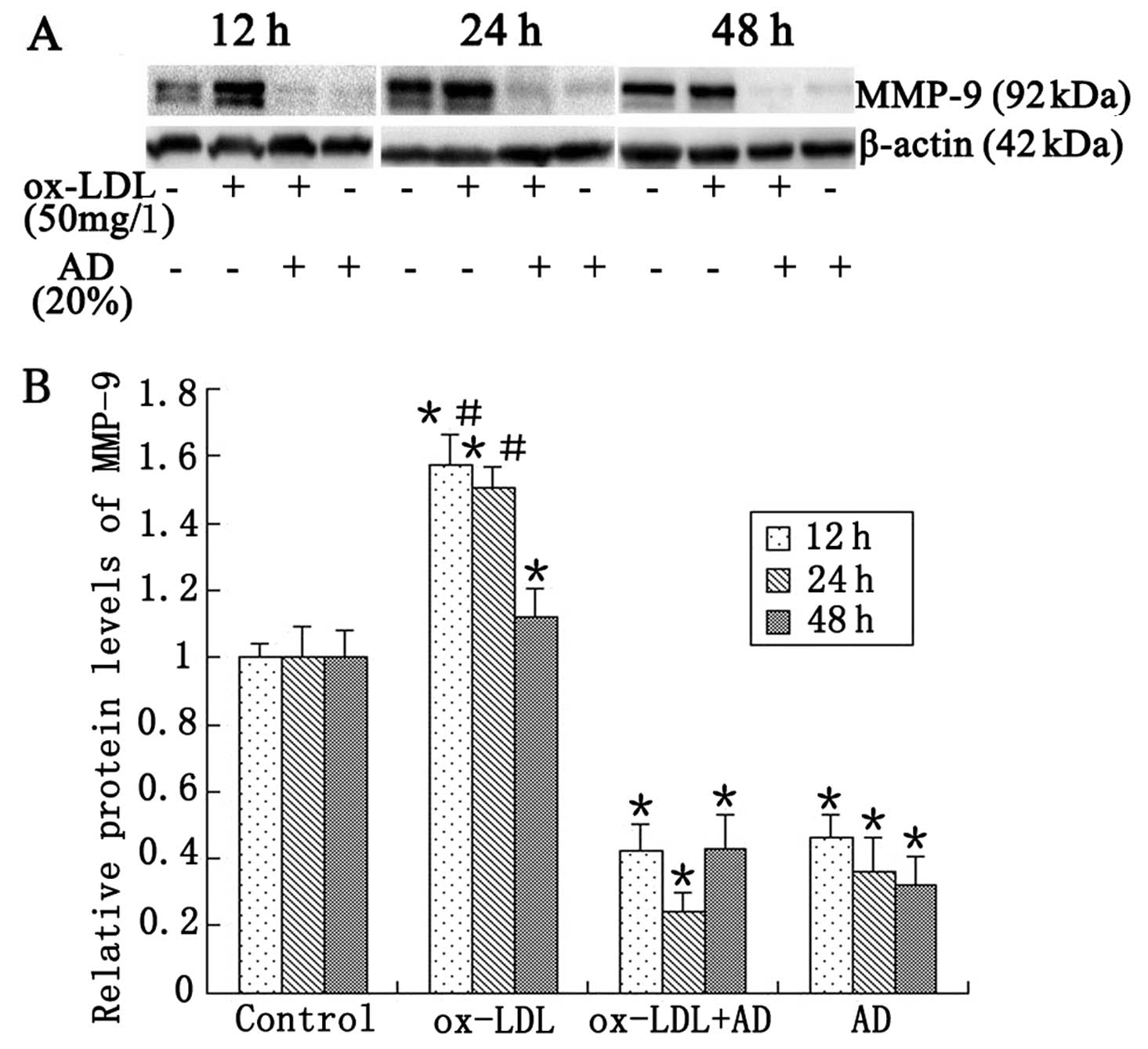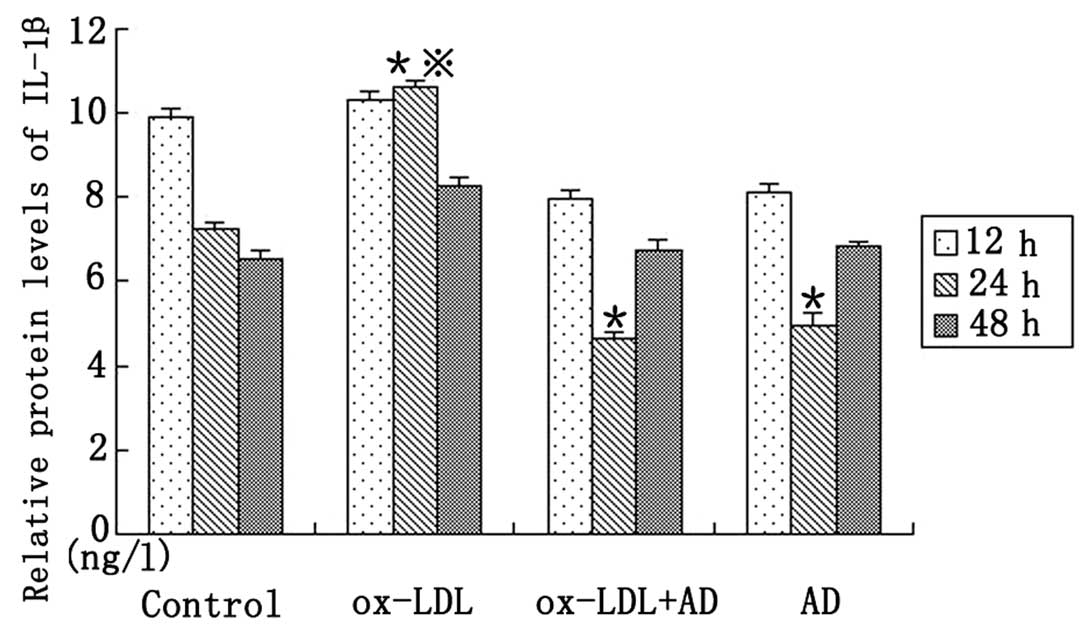|
1
|
Lusis AJ: Atherosclerosis. Nature.
407:233–241. 2000. View
Article : Google Scholar : PubMed/NCBI
|
|
2
|
Bonamassa B and Moschetta A:
Atherosclerosis: lessons from LXR and the intestine. Trends
Endocrinol Metab. 24:120–128. 2013. View Article : Google Scholar : PubMed/NCBI
|
|
3
|
van Diepen JA, Berbée JF, Havekes LM and
Rensen PC: Interactions between inflammation and lipid metabolism:
Relevance for efficacy of anti-inflammatory drugs in the treatment
of atherosclerosis. Atherosclerosis. 228:306–315. 2013.PubMed/NCBI
|
|
4
|
Venkateswaran A, Laffitte BA, Joseph SB,
et al: Control of cellular cholesterol efflux by the nuclear
oxysterol receptor LXR alpha. Proc Natl Acad Sci USA.
97:12097–12102. 2000. View Article : Google Scholar : PubMed/NCBI
|
|
5
|
Zelcer N and Tontonoz P: Liver X receptors
as integrators of metabolic and inflammatory signaling. J Clin
Invest. 116:607–614. 2006. View
Article : Google Scholar : PubMed/NCBI
|
|
6
|
Edwards PA, Kennedy MA and Mak PA: LXRs;
oxysterol-activated nuclear receptors that regulate genes
controlling lipid homeostasis. Vascul Pharmacol. 38:249–256.
2002.PubMed/NCBI
|
|
7
|
Castrillo A, Joseph SB, Marathe C, et al:
Liver X receptor-dependent repression of matrix metalloproteinase-9
expression in macrophages. J Biol Chem. 278:10443–10449. 2003.
View Article : Google Scholar : PubMed/NCBI
|
|
8
|
Giannarelli C, Cimmino G, Connolly TM, et
al: Synergistic effect of liver X receptor activation and
simvastatin on plaque regression and stabilization: an magnetic
resonance imaging study in a model of advanced atheroselerosis. Eur
Heart J. 33:264–273. 2012. View Article : Google Scholar
|
|
9
|
Calkin AC and Tontonoz P: Liver x receptor
signaling pathways and atherosclerosis. Arterioscler Thromb Vasc
Biol. 30:1513–1518. 2010. View Article : Google Scholar : PubMed/NCBI
|
|
10
|
Liv J: The efficacy evaluation of Alisma
Decoction assiting on western medicine treating essential
hypertension. Shi Yong Yao Wu Yu Lin Chuang. 16:629–630. 2013.(In
Chinese).
|
|
11
|
Liv S, Cao K and Wang P: Alisma Decoction
treating hyperlipidemia by 120 Cases. Zhong Yi Yao Lin Chuang Za
Zhi. 17:4542005.(In Chinese).
|
|
12
|
Tang X, Zhai Y and Liu T: The effect of
Alisma Decoction on hemorheology and serum nitric oxide on
experimental hyperlipidemia rats. Zhong Guo Shi Yan Fang Ji Xue Za
Zhi. 12:26–28. 2006.(In Chinese).
|
|
13
|
Steinberg D: Atherogenesis in perspective:
hypercholesterolemia and inflammation as partners in crime. Nat
Med. 8:1211–1217. 2002. View Article : Google Scholar : PubMed/NCBI
|
|
14
|
Glass CK and Witztum JL: Atherosclerosis.
The road ahead. Cell. 104:503–516. 2001. View Article : Google Scholar : PubMed/NCBI
|
|
15
|
Jiang Y, Wang M, Huang K, et al: Oxidized
low-density lipoprotein induces secretion of interleukin-1β by
macrophages via reactive oxygen species-dependent NLRP3
inflammasome activation. Biochem Biophys Res Commun. 425:121–126.
2012.
|
|
16
|
Repa JJ, Turley SD, Lobaccaro JA, et al:
Regulation of absorption and ABC1-mediated efflux of cholesterol by
RXR heterodimers. Science. 289:1524–1529. 2000. View Article : Google Scholar : PubMed/NCBI
|
|
17
|
Hong C and Tontonoz P: Coordination of
inflammation and metabolism by PPAR and LXR nuclear receptors. Curr
Opin Genet Dev. 18:461–467. 2008. View Article : Google Scholar : PubMed/NCBI
|
|
18
|
Joseph SB, Castrillo A, Laffitte BA,
Mangelsdorf DJ and Tontonoz P: Reciprocal regulation of
inflammation and lipid metabolism by liver X receptors. Nat Med.
9:213–219. 2003. View
Article : Google Scholar : PubMed/NCBI
|
|
19
|
Qian Y and Ni Z: The effect of liver X
receptors in metabolism and inflammation. Lin Chuang Xin Xue Guan
Bing Za Zhi. 23:806–810. 2007.(In Chinese).
|
|
20
|
Parks WC and Shapiro SD: Matrix
metalloproteinases in lung biology. Respir Res. 2:10–19. 2001.
View Article : Google Scholar
|
|
21
|
Ferretti G, Bacchetti T, Marotti E and
Curatola G: Effect of homocysteinylation on human high-density
lipoproteins: a correlation with paraoxonase activity. Metabolism.
52:146–151. 2003. View Article : Google Scholar : PubMed/NCBI
|
|
22
|
Fang L, Du XJ, Gao XM and Dart AM:
Activation of peripheral blood mononuclear cells and extracellular
matrix and inflammatory gene pro file in acute myocardial
infarction. Clin Sci (Lond). 119:175–183. 2010. View Article : Google Scholar : PubMed/NCBI
|
|
23
|
Halade GV, Jin YF and Lindsey ML: Matrix
metalloproteinase (MMP)-9: a proximal biomarker for cardiac
remodeling and a distal biomarker for inflammation. Pharmacol Ther.
139:32–40. 2013. View Article : Google Scholar : PubMed/NCBI
|
|
24
|
Krex D, Schachert HK and Schackert G:
Genesis of cerebral aneurysms - an update. Acta Neurochir (Wien).
143:429–449. 2001. View Article : Google Scholar : PubMed/NCBI
|
|
25
|
Sigala F, Kotsinas A, Savari P, et al:
Oxidized LDL in human carotid plaques is related to symptomatic
carotid disease and lesion instability. J Vasc Surg. 52:704–713.
2010. View Article : Google Scholar : PubMed/NCBI
|
|
26
|
Huang Y, Mironova M and Lopes-Virella MF:
Oxidized LDL stimulates matrix metalloproteinase-1 expression in
human vascular endothelial cells. Arterioscler Thromb Vasc Biol.
19:2640–2647. 1999. View Article : Google Scholar : PubMed/NCBI
|
|
27
|
Moyer CF, Sajuthi D, Tulli H and Williams
JK: Synthesis of IL-1 alpha and IL-1 beta by arterial cells in
atherosclerosis. Am J Pathol. 138:951–960. 1991.PubMed/NCBI
|
|
28
|
Tipping PG and Hancock WW: Production of
tumor necrosis factor and interleukin-1 by macrophages from human
atheromatous plaques. Am J Pathol. 142:1721–1728. 1993.PubMed/NCBI
|
|
29
|
Church LD, Cook GP and McDermott MF:
Primer: inflammasomes and interleukin 1beta in inflammatory
disorders. Nat Clin Pract Rheumatol. 4:34–42. 2008. View Article : Google Scholar : PubMed/NCBI
|
|
30
|
Dinarello CA: Anti-inflammatory agents:
present and future. Cell. 140:935–950. 2010. View Article : Google Scholar : PubMed/NCBI
|
|
31
|
Rader DJ: IL-1 and atherosclerosis: a
murine twist to an evolving human story. J Clin Invest. 122:27–30.
2012. View
Article : Google Scholar : PubMed/NCBI
|
|
32
|
Kirii H, Niwa T and Yamada Y: Lack of
interleukin-1beta decreases the severity of atherosclerosis in
ApoE-deficient mice. Arterioscler Thromb Vasc Biol. 23:656–660.
2003. View Article : Google Scholar : PubMed/NCBI
|
|
33
|
Dinarello CA: Biologic basis for
interleukin-1 in disease. Blood. 87:2095–2147. 1996.PubMed/NCBI
|
|
34
|
Ku G, Thomas CE, Akeson AL and Jackson RL:
Induction of interleukin 1beta expression from human peripheral
blood monocyte-derived macrophages by 9-hydroxyoctadecadienoic
acid. J Biol Chem. 267:14183–14188. 1992.PubMed/NCBI
|
|
35
|
Naik SU, Wang X, Da Silva JS, et al:
Pharmacological activation of liver X receptors promotes reverse
cholesterol transport in vivo. Circulation. 113:90–97. 2006.
View Article : Google Scholar : PubMed/NCBI
|
|
36
|
Chawla A, Boisvert WA, Lee CH, et al: A
PPAR gamma-LXR-ABCA1 pathway in macrophages is involved in
cholesterol efflux and atherogenesis. Mol Cell. 7:161–171. 2001.
View Article : Google Scholar : PubMed/NCBI
|
|
37
|
Guo ZG, Wu PS, Li JH and Lai WY:
Modulation of inflammatory cytokines by ATP-binding cassette A1 in
THP-1 macrophages. Nan Fang Yi Ke Da Xue Xue Bao. 26:1269–1271.
2006.(In Chinese).
|
|
38
|
Li J, Yang Y, Hao P and Guo Z: ABCA1
regulating on inflammatory cytokines and its significance on
vascular smooth muscle cells. Shi Yong Yi Xue Za Zhi. 26:1713–1716.
2010.(In Chinese).
|
|
39
|
Yin K, Liao DF and Tang CK: ATP-binding
membrane cassette transporter A1 (ABCA1): a possible link between
inflammation and reverse cholesterol transport. Mol Med.
16:438–449. 2010.PubMed/NCBI
|
|
40
|
Reddy ST, Hama S, Ng C, Grijalva V, Navab
M and Fogelman AM: ATP-binding cassette transporter-1 participates
in LDL Oxidation by artery wall cells. Arterioscler Thromb Vasc
Biol. 22:1877–1883. 2002. View Article : Google Scholar : PubMed/NCBI
|
|
41
|
Zhou X, Yin Z, Guo X, Hajjar DP and Han J:
Inhibition of ERK1/2 and activation of liver X receptor
synergistically induce macrophage ABCA1 expression and cholesterol
efflux. J Biol Chem. 285:6316–6326. 2010. View Article : Google Scholar : PubMed/NCBI
|















